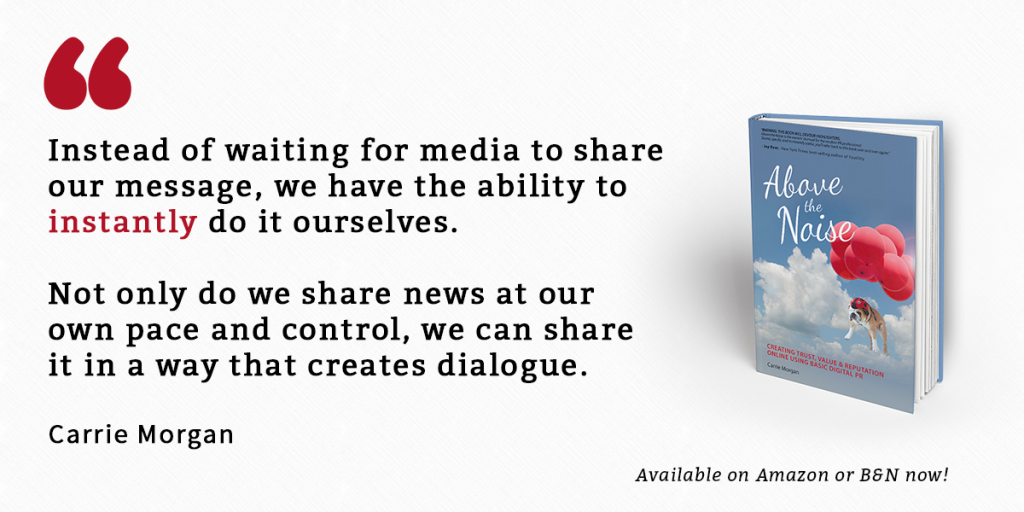On writing: Carrie Morgan rocks the status quo
Welcome to the first “On Writing” interview, a monthly series in which a marketing communications pro will answer seven questions about writing. This month, public relations consultant and author Carrie Morgan of Rock the Status Quo agreed to be the first victim pro to participate. Find her thoughts below.

Carrie Morgan
Author of Above The Noise: Creating Trust, Value & Reputation Online Using Digital PR. Senior digital PR consultant – public relations, content marketing, social media & SEO. Author. Feisty word nerd. #PRprochat founder.
Organization: Rock The Status Quo
Twitter: @morgancarrie
1. What role does writing play in your work and how important a skill is it?
As a PR professional who focuses on digital PR, I’d consider writing to be my most important skill, and something that quickly sets me apart from competitors. It drives over 90 percent of my revenue, since I specialize in content marketing, messaging and search engine optimization, allowing me to achieve amazing results for my clients. I constantly work to improve my storytelling skills, too, which is a fascinating trend to watch right now. My love of writing and helping others led to publication of my first book, Above The Noise. It launched just this week, and can be found at Amazon, Barnes & Noble and many bookstores.
2. Does writing well still matter in a digital/text/emoji world?
Writing absolutely matters! From a great headline driving social shares and viral activity to a 140-character tweet, our ability to wordsmith drives conversion and success, or feeds client failure. A picture might say a thousand words, but a few words strung together creatively have REMARKABLE power. As an industry, communications professionals don’t put nearly enough emphasis on the importance of writing skills. It’s an essential skill. In my opinion, every minute you invest in improving your writing skills (and reading – which improves writing skills almost by osmosis!) delivers a huge dividend. As far as self-education goes, the benefits far outweigh the energy and time it requires to improve. LinkedIn long-form posts or Medium are great places to practice if you don’t want to create your own branded blog. LinkedIn particularly works well, since it also helps you build a personal brand – always a solid career move.
3. What’s the best advice you’ve received or would give on how to improve writing skills?
Read as much as possible, since it boost your vocabulary and grammar skills through exposure, write as much as possible to practice your skills, and invest at least a few hours each month learning something new. Michael Margolis provides a wonderful free eBook on business storytelling skills at GetStoried.com. I’m excited to say he’ll be a guest on #PRprochat in April, if you’d like to join us!
4. What are your top three writing resources or references (digital or paper-based)?
I don’t use very many tools, actually, I just write as often as possible. My blog is my #1 tool, since it is the primary place that I practice my writing skills. Twitter is fabulous for teaching brevity while remaining compelling. I also curate marketing and PR content every day, which keeps me on top of new trends and tips throughout the day.
5. Do you follow a style guide, and if so, which one?
I follow the AP Stylebook for public relations content that will be exposed to journalists or formal media platforms – such as press releases, byline articles for a media publication and media pitches. For other kinds of content however, such as blogging or infographics, I fit the style to the outlet. Many non-journalistic media use the Chicago Manual of Style or Strunk & White. A blog post for a business journal might use AP style, but a blog post for a client should be consistent with the style already used on their site. Blogging especially can often use a less formal style of writing. I match the style to the platform as much as possible.
6. What’s your top—most cringe-worthy—writing/grammar/usage pet peeve?
My biggest pet peeve? That’s a tough one…. I really hate it when people retweet something with an error in it. If you liked it enough to share it, take a second to fix the error before you pass it on. Otherwise their error becomes YOUR error. Another pet peeve are press release quotes that sound like every other quote. Be bold, take a stand and write something with a bit of thought leadership to it.
7. What’s your favorite word and what’s your least favorite?
My favorite word is “heinous”—I think because it’s a word my teenage son really hates, so the look on his face and his reaction when I use it encourage me to repeat it as much as possible. My least favorite word is any misspelled word.
Carrie has just released her book, Above the Noise. Writing a book has its own special challenges, so I asked Carrie to elaborate.
How long did it take you to write this book?
This book is several years in the making, because I started out with a different book than the one actually published this week. It took FAR more time to write than I expected, though – about six months of weekends and nights. Building the platform before I approached publishers with my book proposal was about eighteen months of solid effort, on top of time invested to actually write the book.
Did you face any obstacles and how did you overcome them?
It was an interesting journey! For my first book idea, Digital Haystack, I spent over a year and a half building my platform, then reached out to New York book agents until I landed one, thinking that would help me land a book deal. It wasn’t a good experience. Basically, all the agent did was take a book proposal I’d already created, and email it out to a small database of contacts. I had to push her and babysit the process every step of the way. When we finally landed a deal, I ended up firing the publisher (who wanted to change the name of the book, a decision from its board of directors who knew nothing about marketing as an industry and wanted to use a term that’s been outdated for a decade on a book of modern best practices). After I’d cancelled that contract, with no help from the agent, I ended up also firing the agent because she made no effort to sell the book. So that I wouldn’t have to pay her a commission, I restructured the book and sold it within twenty minutes of sending out my new book proposal. It was an interesting process, for sure, and I learned some valuable lessons. I’m already working on my second book.
Any tips for people thinking of writing a book?
Build an audience before you write the book, and begin marketing LONG before the book is published, otherwise you’ll never rise above the noise to be heard. You also won’t be able to draw the interest of publishers, if that’s your goal. They want pre-existing audience for the book. There’s also a common misconception that publishers will do the book marketing for you. False! They are printers with lackluster marketing skills who only invest budget marketing authors who are already proven to be successful. They do next to nothing for new authors. You must be prepared to do it yourself AND have a budget for that marketing. Also, be very careful of self-publishing. I’d estimate that 90% or more of self-published books were written for vanity reasons and missing the kind of quality a publisher would require, but it’s a huge market where everyone makes money except for the author. Also know that self-publishing carries a different kind of clout than something put out by a publishing house. Know the difference, and make sure the road you choose fits your goals for the book. One last thought: before I began the journey to being an author, I had no clue that over 95% of authors make next to NO MONEY on their book. Write it for other reasons. I wrote my book to build up my reputation as a consultant, not to sell books.
Stay tuned to this space for upcoming On Writing interviews. And remember, if you need to create or recreate marketing materials, I am here to help!
About Deborah Brody
Deborah Brody writes and edits anything related to marketing communications. Most blog posts are written under the influence of caffeine.



